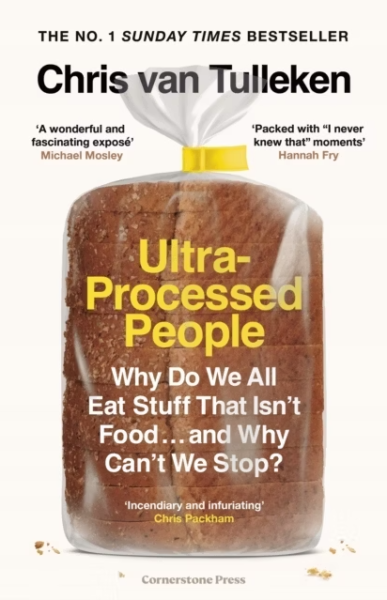Christopher Snowden seems, for some inexplicable reason, to be skeptical about the hysterical warnings of people like Chris van Tulleken in his recent book Ultra-Processed People: Who Do We All Eat Stuff That Isn’t Food … and Why Can’t We Stop?
If Jamie Oliver is the fun police, Chris van Tulleken is the Taliban. The selling point of books like Ultra-Processed People is the idea that everything you know is wrong. Van Tulleken, an infectious diseases doctor and television presenter, takes this to extremes. In this book, almost everybody is wrong, many of them are corrupt and almost no one is to be trusted. Only Dr. van Tulleken, a handful of researchers and anyone who pays £25 to read this book knows the real truth. The problem is not sugar. The problem is not carbs. Artificial sweeteners don’t work. Exercise doesn’t work. Willpower doesn’t work. Every scientist who has published research contradicting his theory is in the pay of the food industry or — how’s this for an ad hominem argument? — has cited studies by people who are. The British Nutrition Foundation, the Academy of Nutrition and Dietetics, the British Dietetic Association, the Centre for Social Justice, the Institute of Economic Affairs, Tortoise Media, Diabetes UK, Cancer Research UK and the British Heart Foundation are all tainted by food industry funding. Even Jamie Oliver – Saint Jamie, the Sage of Essex — is guilty by his association with Tesco and Deliveroo, and because he makes ultra-processed food (“albeit fairly marginal items”).
It is this ultra-processed food (UPF), argues van Tulleken, that is the real cause of obesity and diet-related diseases in the world today. Food is classified as UPF if it is wrapped in plastic and contains an ingredient you don’t have in your kitchen. This includes everything from mustard to Magnums but, counter-intuitively, doesn’t include sugar, salt or fat. Van Tulleken doesn’t quite put it like this but, in effect, anything you make at home is healthy while nearly anything you buy in a supermarket, aside from raw ingredients, is bad for you.
The evidence for this striking proposition can be briefly outlined, and van Tulleken deals with it swiftly in a single chapter. Firstly, there are a number of studies using observational epidemiology which find a correlation between diets which are high in UPF and various ailments, including not only obesity, heart disease and type 2 diabetes, but also dementia, depression, cancer and more. Secondly, there is a randomised controlled trial which gave a small group of volunteers a two-week diet of either ultra-processed food or minimally processed food. The nutritional profile of each diet was similar (the same levels of salt, sugar, etc.) and the volunteers were offered twice as much as they needed to maintain a healthy weight. The people on the ultra-processed diet ended up eating 500 calories more than the people on the minimally processed diet and put on nearly a kilogram of weight.
The randomised controlled trial was published in 2019 and already has over 1,200 academic citations. Van Tulleken considers it to be extraordinarily robust, but it only really stands out because the general standard of dietary research is so poor. The volunteers were not given ultra-processed versions of the same meals. They were given totally different meals, plus very different snacks, and they could eat as much as they wanted for free. What does it actually demonstrate? Arguably, all it shows is that if you give people unlimited quantities of tasty food, they will eat more of it than if you give them blander food. Van Tulleken assures us that “the two diets were equally delicious”, but this would seem to contradict his claims elsewhere that UPF is “hyper-palatable”, delicious and irresistible.
As for the epidemiological correlations, what is it that actually correlates? UPF is an incredibly broad category encompassing most foods that are known as HFSS (high in fat, sugar or salt) and many more besides. People who eat a lot of UPF tend to have lower incomes, which correlates with all sorts of health conditions. In the study van Tulleken cites to demonstrate that UPF causes cancer, the people who ate the most UPF had the highest smoking rate and were least likely to be physically active. Epidemiologists attempt to control for such factors, but with so much going on in the data, it is an heroic assumption to think that the effect of food processing can be teased out from the effects of fat, sugar, salt, obesity, smoking, stress, exercise and numerous socio-economic influences.




